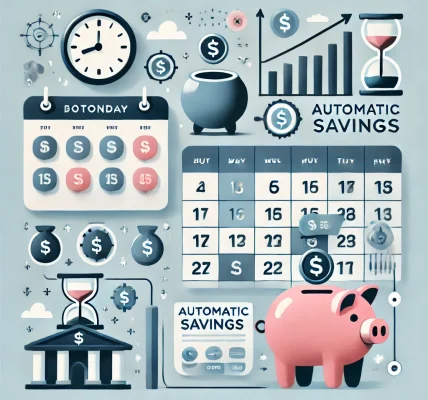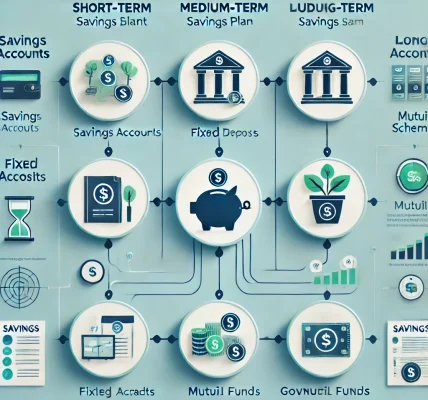Entrepreneurship is a thrilling journey filled with highs and lows. While the excitement of building your own business is unmatched, it often comes with the challenge of maintaining financial stability for both the present and the future. One of the most crucial aspects of ensuring long-term success is having a solid saving plan that can secure your future. In this blog, we will explore practical saving strategies for entrepreneurs that not only safeguard your personal wealth but also provide a cushion for your business ventures.
Why Entrepreneurs Need a Strong Saving Plan
As an entrepreneur, you wear many hats, and the unpredictability of running your own business can be overwhelming. Income might not always be steady, and the risk of market fluctuations can impact your financial standing. This is where a robust saving plan becomes your safety net. It helps ensure that no matter what happens in your business, you’re still prepared to weather any financial storm and live a comfortable life.
1. Separate Personal and Business Finances
One of the most important steps for any entrepreneur is to keep their personal finances separate from their business finances. This creates a clearer picture of your personal financial health and makes it easier to save for your future without being bogged down by business expenses.
- Actionable Tip: Open separate bank accounts for your business and personal finances. This way, you can clearly track your business’s earnings and set aside a portion for personal savings.
2. Create an Emergency Fund
An emergency fund is the cornerstone of any strong saving strategy, especially for entrepreneurs. This fund should be large enough to cover personal living expenses for at least 3-6 months. By having this financial cushion, you can focus on your business without the stress of day-to-day money worries.
- Actionable Tip: Set aside a percentage of your monthly income, even if it’s small, and gradually build this emergency fund over time. It’s better to start small than not to start at all.
3. Take Advantage of Retirement Accounts
When you work for a company, retirement savings are often automatic. However, as an entrepreneur, you are responsible for your own future. Contributing to retirement accounts, such as an IRA or SEP-IRA, can help ensure that you have money saved for your golden years while providing tax benefits today.
- Actionable Tip: Look into tax-advantaged retirement accounts specifically designed for self-employed individuals, such as a SEP-IRA or Solo 401(k). These accounts offer higher contribution limits and tax advantages that can help you save more.
4. Invest in Low-Risk Options
As a business owner, your investments should not be confined solely to the business. To secure your financial future, you must also invest in low-risk assets that generate steady returns over time. This includes stocks, bonds, index funds, or real estate investments. These assets help diversify your wealth and reduce dependency on the performance of your business.
- Actionable Tip: Work with a financial advisor to build a diversified portfolio that fits your risk tolerance. Start with low-risk investments to ensure long-term growth.
5. Pay Yourself First
Entrepreneurs often fall into the trap of pouring all their income back into the business, leaving little room for personal savings. To avoid this, practice paying yourself first. Treat your personal savings as a non-negotiable expense, just like paying business expenses or employees.
- Actionable Tip: Set up an automatic transfer to your personal savings account each time your business receives income. Even 5% of your earnings can add up over time.
6. Monitor Your Cash Flow Regularly
Cash flow is the lifeblood of your business, and it’s important to track both personal and business cash flow regularly. By doing so, you can identify areas where you’re overspending, plan for future investments, and make adjustments to ensure that you’re saving enough.
- Actionable Tip: Use financial tracking tools like QuickBooks or Mint to monitor both your personal and business finances. This will help you track your saving progress and adjust your strategy accordingly.
7. Plan for Taxes Early
As an entrepreneur, you’re responsible for managing your own taxes. By setting aside a portion of your income for taxes throughout the year, you can avoid a large tax bill at the end of the year. Additionally, contributing to retirement plans can lower your taxable income, helping you save more in the long run.
- Actionable Tip: Estimate your tax liability quarterly and set aside a percentage of your income for taxes. Consult with a tax professional to understand deductions you can take advantage of as a business owner.
8. Reinvest in Your Business Wisely
While saving for your future is important, reinvesting in your business also plays a significant role in securing your long-term financial success. Reinvesting profits into growth areas—whether it’s marketing, new technology, or scaling your team—can lead to greater profits and more stability in the future.
- Actionable Tip: Use a portion of your earnings to invest in the growth of your business. This can also lead to more revenue, allowing you to save and invest more in your personal future.
9. Create a Financial Vision for Your Future
As an entrepreneur, it’s easy to get caught up in the day-to-day tasks of running your business. However, it’s essential to have a clear vision of where you want to be financially in 5, 10, or even 20 years. This vision will help guide your saving plan and ensure you stay on track.
- Actionable Tip: Write down your long-term financial goals and review them regularly. Break them down into achievable milestones and adjust your strategy as necessary.
Conclusion: The Power of Consistency in Your Saving Plan
Entrepreneurs are naturally driven and resourceful, but creating a financial safety net requires a combination of discipline, consistency, and strategic planning. By setting up a solid saving plan, you not only protect your business from unforeseen challenges but also secure your personal future. Remember, the earlier you start saving, the more you can take advantage of compound growth.
Start small, stay consistent, and over time, you’ll see your financial security grow. Your future self will thank you for the sacrifices and strategies you put in place today.


